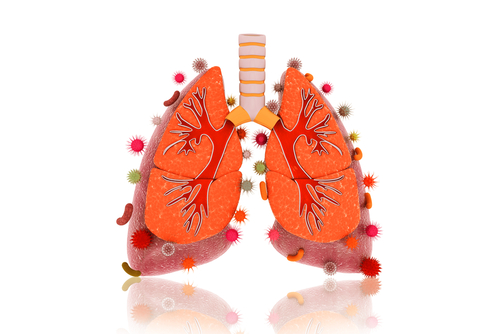Impaired antibacterial activity of neutrophils in bronchiectasis patients may be why they are so susceptible to chronic lung infections, according to researchers from the U.K.
Their study, “Blood Neutrophils are Reprogrammed in Bronchiectasis,” was published in the American Journal of Respiratory and Critical Care Medicine.
Bronchiectasis is associated with bacterial infections and inflammation in airways, which makes patients susceptible to ongoing cycles of infections and sustained damage.
Immune cells called neutrophils, a type of white blood cell, have a central role in the body’s defense against infections by eliminating pathogens through a process called phagocytosis.
Patients with bronchiectasis have more than usual numbers of these immune cells in their airways, so it is unclear why patients are prone to repeated infections.
To study the function of neutrophils in bronchiectasis, scientists from the University of Edinburgh in Scotland analyzed eight mild and eight severe bronchiectasis patients, as well as eight healthy volunteers. They also compared six patients with severe bronchiectasis with six pneumonia patients at the start and end of an exacerbation, or flare-up.
Among other parameters, the team analyzed the levels of neutrophils on cell surface markers, and bacterial response against Pseudomonas aeruginosa — a common cause of respiratory infections.
Results revealed that, compared to healthy people, the neutrophils in patients with stable bronchiectasis lived longer, had increased levels of protein markers CD62L and CD11b — known to be associated with their activation — and showed impairments in their ability to kill P. aeruginosa bacteria.
In bronchiectasis, this antibacterial activity was significantly lower in airways than in blood. Both blood and airway cells showed impaired activity at the start of a flare-up, which improved following antibiotic treatment.
A similar improvement was observed in patients with pneumonia after antibiotic treatment. The data also showed that, compared to bronchiectasis flare-ups, patients with pneumonia showed increased bacterial killing at the start and end of infection.
“In bronchiectasis stable state, peripheral blood neutrophils are reprogrammed and have prolonged survival. This impairs their functional ability of bacterial phagocytosis and killing, thereby perpetuating the vicious circle in bronchiectasis,” the scientists wrote.
“This study has identified that the key cells in bronchiectasis — the neutrophils — are reprogrammed and do not function as they normally should do,” Pallavi Bedi, MD, the study’s lead author, said in a press release. “This should now help us to develop more targeted, non-antibiotic therapies in bronchiectasis.”
The researchers team also said that further research is warranted to better understand how to improve the function of neutrophils in bronchiectasis, and whether this could help stop infections and improve patients’ quality of life.

